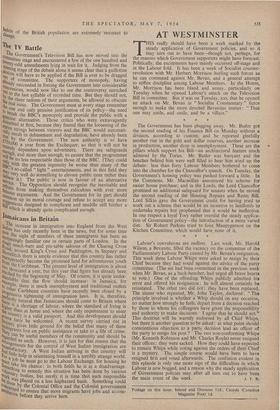T he TV Battle The Government's Television Bill has now moved
into the ilvvrotnittee stage and encountered a few of the one hundred and 0 entY-odd amendments lying in wait for it. Judging from the rien.ing stage of the debate alone it seems clear that a guillotine out will have to be applied if the Bill is ever to be dragged ll; of committee. The supporters of monopoly, having 00eady succeeded in forcing the Government into considerable out to would now like to see the controversy stretched but to the last syllable of recorded time. But they should not, ,,?? the sheer tedium of their arguments, be allowed to obscuie the ereal issue. The Government must at every stage remember toekette and only genuine justification of its policy—the need genuine the BBC's monopoly and provide the public with a disturbed alternative. Those critics who were extravagantly uaisturbed at first, because they feared that the loosening of the call strings between viewers and the BBC would automati- rZly result in debasement and degradation, have already been tio.01 the Government. The new authority is.__tohave ent,..- i'' year from the Exchequer, so that it will not be rely dependent upon advertisers. There are safeguards enou k iv :I, gu, and more than enough, to ensure that the programmes oz be no less respectable than those of the BBC. (They could bp1,-,Y With the greatest ingenuity be worse than many of the „"L's so-called ' light " entertainments, and in this field they .cileakY very well do something to elevate public taste rather than ge (Ise it.) The public is now in favour of an alternative rerfryte.e. The Opposition should recognise the inevitable and fat am from making themselves ridiculous with ever more suIleus arguments. And the Government for its part should sornon up its moral courage and refuse to accept any more biEgestions designed too o complicate and muddle still further a II which is already quite complicated enough.










































 Previous page
Previous page